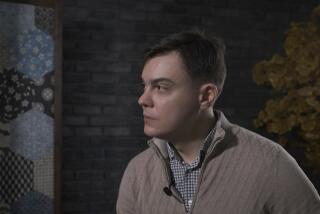Would-Be Soviet Capitalist Ponders the Pros and Cons
- Share via
MOSCOW — For nearly 20 years, Alexei Aleinikov has been a driver.
He drove buses, trucks and chauffeured cars here despite his philosophy degree from Leningrad University, his Communist Party membership and the chance to preach the benefits of Marxism to schoolchildren and factory workers.
Gradually aware of how much the ugly realities of Soviet communism differed from grand textbook dreams, he renounced a budding career he now describes as “telling people lies with enough conviction so they believed them” and went behind a wheel.
“Better to be a good driver than a crappy philosopher,” said Aleinikov, 45. “When I began to drive, I felt for the first time in my life I was doing something useful.”
Although it took him another 18 years to renounce his party membership, there were echoes of Alexander Solzhenitsyn’s call for a passive, moral resistance to communism in Aleinikov’s decision--a decision he describes today as the most painful of his life. It was a choice that few of his friends or family wanted to understand until last month’s attempted putsch that spelled the end of Communist rule.
Those tumultuous events that so reshaped the Soviet state and transfixed a fascinated world have also opened doors to opportunity for people like Aleinikov in a way that few believed possible only a few weeks ago.
Whether he and people like him decide to go through those doors will determine much of the nation’s future.
At a weekend meeting, Russian Federation Prime Minister Ivan S. Silayev said that the psychology of the Soviet people is the greatest obstacle to economic renewal.
“We will have to make strenuous efforts to change their way of thinking,” Silayev told the World Economic Forum. Certainly Aleinikov has no dearth of ideas.
He sees an opening in the Moscow market for a driving school that caters to foreigners and talks of how it might work.
“There are many teen-age children in the foreign community, and no school is equipped to give them the necessary lessons for a driver’s license,” he said. “I think that could be very profitable.”
He also sees the potential for streamlining the operations of his present employer, a Soviet-Japanese joint-venture company that offers chauffeur-driven rental cars. He says that if he had the money, he would like to organize a competitor.
Despite his lack of business experience, a natural curiosity and appetite for Western books would seem to give him a head start in a free-market nation.
During his years as a driver, Aleinikov read voraciously, working on his English by reading W. Somerset Maugham in the author’s native language and delving into books on Western-style business management such as Lee Iacocca’s “Iacocca” and a Japanese businessman’s recipe for corporate success.
“If you are going to make a business work, it must function as a team, not a group of individuals,” he noted.
He even dabbled in business after the first reforms of President Mikhail S. Gorbachev offered the chance, working briefly as an agent for a British joint-venture trading company. Although that effort was unsuccessful, he said he learned from the mistakes.
“Bad business, good school,” he said. “The director was so fixated on crisis management and getting a short-term profit, he never developed a real strategy for the longer term.”
But despite the demise of the communism he so despised and an obvious fascination for capitalism, his eagerness to try is tinged with doubt.
He notes, for example, that the mechanics of setting up a business in the Soviet capital remain largely a mystery, often even to the bureaucrats responsible for granting the necessary licenses. Regulations governing rent, taxes and wages have changed so frequently that accurate planning has been impossible.
And while he expects that the regulations will change again, he admitted there is room for optimism. “They can’t get worse,” he said.
But there are other factors.
Although Aleinikov would certainly seem to be a valuable recruit in a post-Communist free-market economy, he’s not sure that it’s worth the effort.
Like many people in the former Soviet satellite countries of Eastern Europe--who have come to question the personal sacrifices of time and energy involved in trying to start a small business in a fledgling, ill-equipped free-market economy--Aleinikov is equivocal about trying and skeptical about his chances.
Over the years, he says, he has adjusted to life in the 350-square-foot apartment he shares with his wife, Natalie, and 13-year-old son, Oleg. He enjoys his free time, his books and his friends.
Besides, he said, there is always the question of start-up money.
“In America, an idea can bring you capital,” he said, “but not here.”
More to Read
Sign up for Essential California
The most important California stories and recommendations in your inbox every morning.
You may occasionally receive promotional content from the Los Angeles Times.













